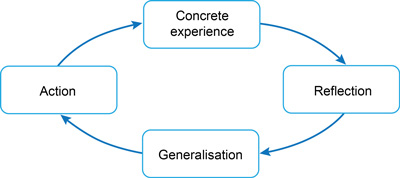Week 8: Educators’ self-care strategies
Introduction
This final week of the course is slightly different from the previous weeks in that it focuses solely on you, the educator. It builds on wellbeing elements that have been introduced in earlier weeks to enable you to develop comprehensive self-care strategies to support your own mental, physical and emotional health. For this week it is suggested that you develop a personal reflective diary in which you can note, and reflect on, each of the self-care related activities.
A frequently used reflective model in education is Kolb’s learning cycle, and you may wish to apply this within your own Week 8 reflections.
Watch the video below on the cycle of learning from experience to refresh yourself in reflective practice for your journal.

Transcript
You have been learning from your life experiences since the day you were born. As human beings, we are born to learn and our process of learning goes on all the time without much awareness. But the awareness and understanding of how you learn can increase your learning power. One way to describe the process of learning is called the experiential learning cycle. What you are experiencing in a particular situation is a gateway to learning about it.
Imagine a sailor lost at sea, reflecting begins the process of learning from the experience by working to notice and understand key aspects of it. Our sailor begins to notice the movement of the stars and thinks, maybe I can use the stars to navigate. Thinking analyses these aspects to create conclusions and evaluate decision choices. Our sailor developed some tools to help analyse the stars and applies it to his map.
Acting to implement a chosen decision, leads back to a new situation with emergent consequences to deal with. With map and navigation tools in hand, he sets off on a new journey, but there is always still more to learn as he encounters new experiences. The learning cycle is an idealised model through which we touch all the bases in a learning situation, experiencing, reflecting, thinking, and acting.
Individuals, however, differ in their preferences for the four phases of learning. Their preferences are related to many factors: culture, personality type, life experiences, educational specialisation, career choice, and current job. Differences in preference usually lie somewhere between opposing phases of the learning cycle, thinking versus experiencing. Two opposite ways of taking in the world, either through direct sense experience or by concepts about it.
And acting versus reflecting, two opposite ways of dealing with ideas and experiences, by an inward search for their meaning or by external action in the world. The more deliberate you are about embracing the opposing phases of the learning cycle, the more effective you will become as a learner.
By the end of this week, you should be able to:
- reflect on and review your own wellbeing and identify personal stressors
- better understand how to establish and maintain professional boundaries
- apply self-compassion and mindfulness to help rebalance your wellbeing
- develop personalised self-care activities.
You will also find an additional resources section at the end of the week which can support your self-care.

